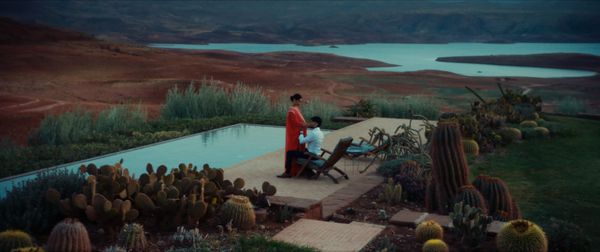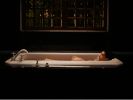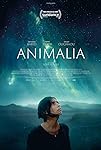Eye For Film >> Movies >> Animalia (2023) Film Review
Animalia
Reviewed by: Jennie Kermode

A powerful statement of intent from first time feature director Sofia Alaoui, and deserving winner of the New Visions award at Sundance, Animalia opens with a series of gorgeously framed symmetrical shots, exterior and then interior, which recall the work of Stanley Kubrick. They’re beautiful partly because of the house they depict, an elegant lakeside Moroccan mansion, but as we’ll soon see, they provide only a taster of what Alaoui can do. They depict a life not only wealthy but perfectly ordered, every detail where it is intended to be. Only Itto (Oumaima Barid) is out of place, attracting scowls from her mother in law when she is caught in the kitchen, chatting to the servants, getting raw meat on the sleeves of her orange silk robe.
“She wanted you to marry a rich girl, not a hick, a nobody’s daughter,” she later laments to her husband, Amine (Mehdi Dehbi). Smiling, he shushes her, tells her she’s overreacting. Just now, that might be comforting, but it’s his attitude to everything, and as she will gradually come to understand, it’s not enough.

Itto’s understanding will emerge from a series of extreme experiences in a situation which disorientates the whole world. Staying home whilst the others drive into town, claiming that her advanced stage of pregnancy is making her feel unwell, she begins to panic when she learns that they have been cut off there by a roadblock. Strange things are happening nearby, a heavy storm cloud forming its own fearful symmetry above the water, soldiers rushing to the lakeside as frogs hastily emerge onto the shore and a lone wolf abruptly savages a sheep. She doesn’t want to be alone, so Amine arranges for a neighbour to drive her into town – a journey which will not go to plan.
Reminiscent in places of Gareth Edwards’ sublime Monsters, Alaoui’s film uses elements of science fiction to explore psychological and sociological experiences of being overwhelmed. Itto’s encounter with a delivery worker, Fouad (Fouad Oughaou), forces her to deal with the shame she has felt about her class and question her relationship with money, whilst the whole process of surviving without a protector makes her realise that she’s tougher than she thought.
The strange behaviour of various animals, frightening at first, begins to make more sense as she grows closer to her own animal instincts. As she faces the reckoning with embodiment which pregnancy makes inescapable, more and more people are forced by the crisis to do something similar, though their reactions to it vary enormously, with some seeking refuge in wealth or religion or the rituals of polite society as other are forced into a much more raw emotional state. Perhaps for the first time, Itto must seriously confront the impact of her choices on more vulnerable people.
Pregnancy is often depicted as a state of enhanced vulnerability, and one which points the way to increased dependency. Here, Alaoui turns that around, presenting us with a character who is empowered to reassess her life and work out what really matters to her. Noé Bach’s cinematography finds a magic in both the extraterrestrial encounters and the natural world which informs Itto’s growing disillusionment with the conventions of luxury, and also pinpoints little details of human interaction which form the bedrock of her reconnection with wider society. In a disturbing sequence at a mosque, limpid beauty gives way to a nerve-wracking focus on detail, the conventions of organised religion also called into question, at odds with Itto’s awakening spirituality.
When the real world is changing in ways which most of us were not prepared for, often to devastating effect, this sort of filmmaking is urgently needed. It doesn’t offer convenient answers but encourages the process of questioning, and of recognising the necessity of change. Most importantly, it looks beyond the fear that change inspires, inviting us to re-engage with what cinema has offered since its earliest days: wonder.
Reviewed on: 15 Jun 2024















